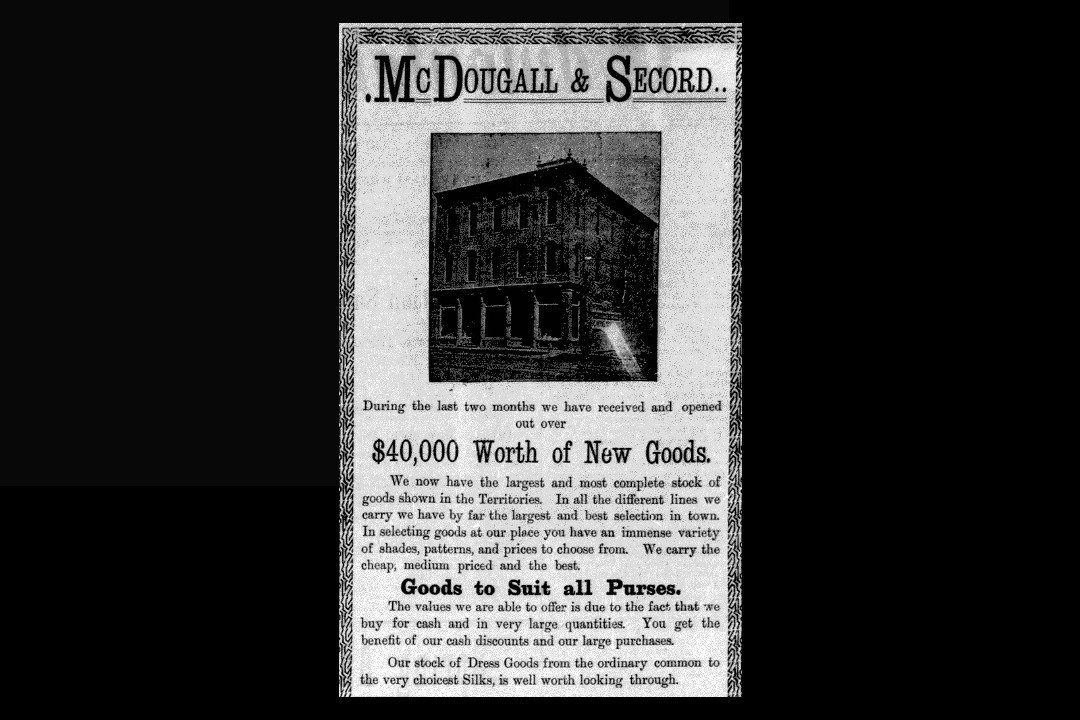On this day in 1899, one of Edmonton's most enduring and influential businesses was advertising its wares.
The McDougall & Secord company got its start in 1897 as a partnership between two now-well-known Edmontonians — John A. McDougall and Richard Secord. McDougall had spent the previous two decades running a general store in the growing settlement. Meanwhile, Secord (who was the great-grandnephew of Canadian historical icon and chocolate mascot Laura Secord) arrived in the area in 1881 and soon became Edmonton's first full-time teacher. He spent time as a high school principal before going into business with McDougall.
McDougall already had extensive experience in trading furs, and that was a lucrative part of the new endeavour. But McDougall & Secord expanded to many different areas; in addition to furs, they sold supplies and goods to fur traders and Edmonton residents alike, as well as dealing in land speculation. Soon, they had the largest loan operation in the province, putting up the funds to finance new homes and businesses in the rapidly growing settlement. Much of downtown Edmonton was financed by investments by McDougall & Secord, including the city's first power company. In 1905, the company built Empire Block on one of the prime pieces of real estate in Edmonton, highlighting their financial success. The pair soon became known as "Edmonton's First Millionaire Teachers."
Given their importance to and influence on Edmonton's development, it's no surprise that both names are plastered all over the city today — both have schools, neighbourhoods, and various other things named after them. But that adoration hides the darker parts of their company's history. Much of the money they made came from Canada's notorious Métis scrip program.
The federal government created the scrip shortly after the 1870 Red River Resistance in now-Manitoba as a way of extinguishing Métis claims. Métis individuals could apply for the scrip, which would entitle them to their choice of a specific amount of land or money (160 acres or dollars to start, later increased to 240 acres or dollars). In the end, an absurdly low percentage of Métis people ever actually received the landthey were promised.
Some of the barriers were legal: applying for scrip could be expensive, cumbersome, and complicated, and was rooted in legal traditions unfamiliar to many of the Métis people involved. Other hurdles were downright criminal, as settler land speculators were eager to get their hands on the scrip to sell off for a profit. Many of them used trickery, obfuscation, intimidation, and outright fraud to gain ownership of the promised land. The federal government was, at best, uninterested in confronting the issues around the program (while some evidence suggests officials encouraged them).
McDougall & Secord were no exception in that regard. Secord, specifically, was accused of at least two cases of abuse of the scrip system. In one case that went to court, he was alleged to have obtained scrip from an 18-year-old Métis woman through coercion and threats to get her parents into legal trouble. The case went up to the Supreme Court of Canada but was dismissed.
In 1921, Secord was accused of hiring someone to impersonate a different Métis woman to fraudulently sign her land over to him. But before that case went to trial, the federal government reduced the statute of limitations for complaints around the scrip system and the case couldn't go forward.
The retail side of McDougall & Secord was sold off in 1907, and the company would focus on finances and land from that point on. Aside from their business success, both Secord and McDougall were involved in politics. Secord served as an alderman in Edmonton and was elected to the territorial government, where he served until Alberta became a province in 1905. McDougall was twice elected as mayor of Edmonton before being elected as an MLA for one term in 1909.
The McDougall & Secord company still exists today, focused on property management. That makes it one of the oldest companies in the province. The Empire Block, which the pair had constructed, was torn down and replaced by the Empire Building, an office tower, in 1962. Just last month, that building was purchased for an undisclosed amount. The new owners say they have plans to renovate the building and seek out new tenants.
This clipping was found on Vintage Edmonton, a daily look at Edmonton's history from armchair archivist @revRecluse of @VintageEdmonton.

